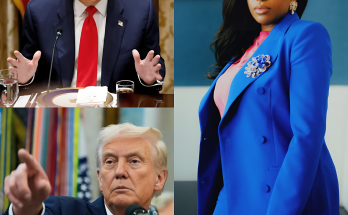Jimmy Kimmel Slams CBS for Canceling The Late Show — His Emotional Outcry Sparks Fears It’s the End of a Late-Night Icon
Late-night television faced a political and cultural flashpoint on July 17, 2025, when CBS stunned viewers and industry insiders by announcing the cancellation of “The Late Show with Stephen Colbert”—its top-rated program—and the retirement of the “Late Show” brand by May 2026. The move triggered an outpouring of shock, anger, and speculation, with fellow late-night host Jimmy Kimmel leading the charge in a viral, expletive-laden social media outburst. As the dust settles, questions swirl about whether this was a business decision, a response to political pressure, or a harbinger of a new era for American media.
:max_bytes(150000):strip_icc():focal(770x272:772x274)/stephen-colbert-jimmy-kimmel2-71825-45660e22b3f34ae9a29b0ac0c7055b14.jpg)
A Shocking Announcement Rocks Late Night
What began as a routine evening in late-night television quickly escalated into an industry-shaking moment. During a live taping, Stephen Colbert broke the news to his audience: “The Late Show” would end its run in the spring. Colbert, visibly emotional yet composed, confirmed the show’s impending conclusion in his nightly monologue. CBS followed with an official statement, attributing the decision to “purely financial considerations amid a challenging late-night landscape,” and insisting it had “nothing to do with the show’s performance, content, or any external political factors.”
Yet, the timing of the announcement raised immediate suspicion. Just three days earlier, Colbert had used his platform to sharply criticize CBS’s parent company, Paramount Global, for settling a $16 million lawsuit with Donald Trump—a suit widely dismissed as frivolous by legal analysts. In his July 15 monologue, Colbert said, “As someone who has always been proud to work for this network, I find it offensive. I don’t know what could possibly restore my faith in this company… but hey, maybe 16 million bucks will help.” Three days later, his show was canceled.
Jimmy Kimmel’s Viral Outburst
The shockwaves intensified when Jimmy Kimmel, host of ABC’s “Jimmy Kimmel Live,” publicly responded on Instagram:
“Love you Stephen. F— you and all your Sheldons, CBS.”
Kimmel’s message, referencing CBS’s reliance on formulaic hits like “The Big Bang Theory” (with its iconic character Sheldon), wasn’t just an expression of support for Colbert—it was a direct rebuke to CBS’s leadership and programming strategy. The post quickly went viral, igniting debate across social media and in industry circles.
Political Reverberations: Is This Retaliation?
The abrupt cancellation sparked immediate reactions from politicians and journalists. Senator Elizabeth Warren tweeted, “CBS canceled Colbert’s show just three days after he criticized Paramount’s $16 million settlement with Trump—a deal that looks like a payoff. America deserves to know if this was canceled for political reasons.” Representative Adam Schiff, who had recently appeared on “The Late Show,” echoed the concern: “If Paramount and CBS ended The Late Show for political reasons, the public deserves to know. And they deserve better.”
These were not fringe voices; they were prominent lawmakers openly questioning whether a major network had silenced its most trusted satirist for speaking out against political power.
The Paramount–Trump Settlement: Context and Consequences
To understand the controversy, it’s important to revisit the details of the Paramount–Trump legal dispute. On July 2, 2025, Paramount Global agreed to pay $16 million to settle Trump’s defamation suit over a 60 Minutes interview aired during the 2024 election cycle. Trump alleged the interview with Kamala Harris had been deceptively edited to portray him negatively. Despite the network’s previous dismissal of the suit as “baseless,” Paramount settled—coinciding with its urgent bid for regulatory approval of an $8 billion merger with Skydance Media, a deal reportedly favored by Trump ally David Ellison.
The sequence—Trump sues, Paramount settles, Colbert criticizes, Colbert is canceled—was, for many, too suspicious to ignore.
Industry and Public Backlash
The industry’s response was swift and vocal. TV producer Mike Schur tweeted, “When media companies cancel late-night shows to appease fascists, America ends. If you think this has nothing to do with politics, wait 24 hours. He’ll brag about it.”
Within a day, Trump posted on Truth Social: “I love that Colbert was fired. His ratings were low, and his talent even lower. Jimmy Kimmel is next. Greg Gutfeld is better than all of them!”
Former CBS anchor Dan Rather called it “a profoundly sad day for journalism,” while Jon Stewart described the moment as “shameful,” likening the Paramount settlement to “paying off the mob.” Even conservative commentators acknowledged Colbert’s consistently strong ratings and his role in keeping CBS competitive in late-night TV.

The Numbers Tell a Different Story
Colbert’s cancellation is even more puzzling given the data. “The Late Show” was leading the late-night ratings with an average of 2.42 million nightly viewers, outpacing Jimmy Kimmel (1.8 million) and Jimmy Fallon (1.2 million). The show dominated digital and YouTube views, and, according to Nielsen and CBS’s internal figures, generated a disproportionate share of the network’s late-night ad revenue. In short, Colbert was profitable and relevant. So why cancel him?
A Troubling Trend for Political Satire
Colbert’s exit is part of a broader pattern. Recent years have seen the cancellation of “Full Frontal with Samantha Bee,” the departure of Trevor Noah from “The Daily Show,” and Jon Stewart’s abrupt exit from Apple TV after creative clashes over topics like China and artificial intelligence. Bit by bit, political satire—the kind that challenges those in power—seems to be disappearing from mainstream television, replaced by safer, less controversial programming.
Veteran media analyst Bill Carter observed, “Late night used to speak truth to power. Now, it feels like it’s being told to sit down and shut up.”
What’s Next for Late Night—and for Colbert?
CBS has announced no replacement for “The Late Show,” and insiders suggest there is no clear plan in place. Meanwhile, the Skydance merger awaits regulatory approval from a federal government now led by Trump allies. Critics argue that this is the crux of the issue: when media companies make editorial decisions to avoid political backlash, the independence of the press is at risk.
Stephen Colbert has not yet revealed his future plans, but sources close to his team suggest he intends to remain in the media landscape, possibly through streaming or an independent platform. For now, his departure leaves a void—and a warning.
Conclusion: A Moment Too Clear to Ignore
The events of this week represent more than the end of a talk show. They mark a moment when a major American network appeared to choose caution over candor, and silence over satire. The nation’s most influential late-night comedian was taken off the air not for lack of success, but for refusing to remain silent.
Jimmy Kimmel’s seven-word message captured the outrage of many in Hollywood and beyond. The rest of America may take longer to respond, but one thing is clear: late-night television didn’t die of natural causes—it was, in the eyes of many, handed over.
In that exchange, we may have lost more than a beloved show. We may have lost one of the last spaces where truth could still make us laugh—and still make us listen.




